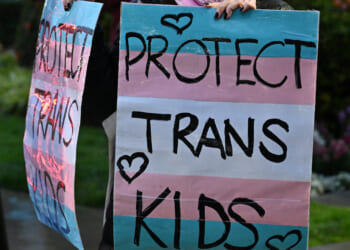University of Arizona professor John Willerton has taken to the pages of the online journal 19Fortyfive to rhapsodize about his hero Mikhail Gorbachev, whom Willerton claims transformed his country and the world. Gorbachev, he writes, was a “dynamic politician who … immediately began a root-and-branch transformation of the Soviet system, economic, political, and societal.”
“Few leaders in our time — or any era — have had such a consequential impact on global politics in such a short time,” Willerton explains. “He set out a more sophisticated definition of national security for all states,” and understood “that a more substantial global institutional-legal structure would enable all states to tackle their interconnected problems.”
Unsurprisingly, there is no mention of Ronald Reagan in Willerton’s article. He writes as if Gorbachev emerged and operated in a vacuum. He didn’t. Gorbachev was selected as Soviet leader to revive a moribund communist system that was under intense economic, military, and political pressure from the Reagan administration and some of its key allies, such as Thatcher’s Great Britain and Kohl’s Germany. Willerton could learn all about this by reading a few excellent books by Paul Kengor and Peter Schweizer and others who have chronicled the fall of the Soviet Union. But those books wouldn’t fit into Willerton’s narrative about his hero.
As Alexander Titov noted, Gorbachev did not set out to change the Soviet system; he tried to save it. His reforms — glasnost and perestroika — were designed to revitalize the Soviet economy and legitimize the rule of the Soviet Communist Party. He failed miserably and unintentionally let loose forces within the Soviet empire that challenged his and the Party’s authority. He pulled out of Afghanistan, for example, because it had become the Soviet’s Vietnam. But under his rule, Soviet forces dropped bombs disguised as toys to kill and maim Afghan children.
Gorbachev’s great contribution to the world was to refuse to enforce the Brezshnev Doctrine (“once communist always communist”) when nationalist uprisings occurred in the nations of the Warsaw Pact. Unlike Khruschev in Hungary in 1956 and Brezshnev in Czechoslovakia in 1968 and Afghanistan in 1979, Gorbachev didn’t use force to maintain the Soviet empire. He didn’t “change the world.” Instead, he passively let political change occur.
Ronald Reagan famously urged Gorbachev to “tear down” the Berlin Wall, but it was not Gorbachev who tore down the wall, it was the citizens on both sides of the wall, especially the eastern side, who did it. By that time (1987), what the Soviets called the “correlation of forces” had turned against them. Reagan had rebuilt the U.S. military and reinvigorated the American spirit. He had worked with oil-producing allies — especially the Saudis — to restrain oil prices, which negatively affected the Soviet economy. He provided military aid to anti-communist resistance forces within the Soviet empire (the Reagan Doctrine). He strengthened NATO by placing intermediate-range nuclear weapons in Western Europe to counter the Soviet SS-20 missiles. And he supported the efforts of Pope John Paul II to challenge the legitimacy of communist parties throughout central and eastern Europe.
Professor Willerton’s hero, by the way, signed on to the Kremlin’s plan to assassinate John Paul II, according to Paul Kengor in his revelatory book A Pope and a President. Kengor noted that the Soviet leadership, including Gorbachev, viewed the Polish pope as an existential threat to their empire. They were right. Willerton’s “dynamic politician” whose “vision and actions profoundly changed both Russia and the world,” apparently had no qualms about killing a Polish pope in order to save the communist system.
Image licensed under CC BY-SA 3.0.
READ MORE:






![Trump's Admin Guts Another ‘Rogue Government Agency with Zero Accountability’ [WATCH]](https://www.right2024.com/wp-content/uploads/2025/03/Trumps-Admin-Guts-Another-‘Rogue-Government-Agency-with-Zero-Accountability-350x250.jpg)
![‘We All Owe Him (Elon) a Huge Debt of Gratitude’ [WATCH]](https://www.right2024.com/wp-content/uploads/2025/03/‘We-All-Owe-Him-Elon-a-Huge-Debt-of-Gratitude-350x250.jpg)


![NCAA Champ Salutes President Trump After ‘BIGGEST UPSET IN COLLEGE WRESTLING HISTORY’ [WATCH]](https://www.right2024.com/wp-content/uploads/2025/03/NCAA-Champ-Salutes-President-Trump-After-‘BIGGEST-UPSET-IN-COLLEGE-350x250.jpg)






